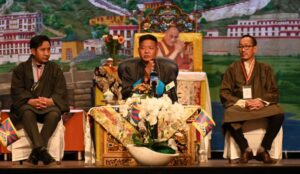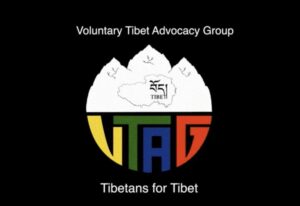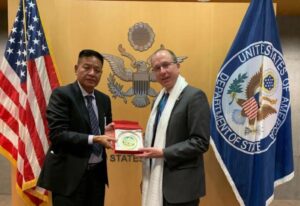
Sikyong Penpa Tsering accompanied by DIIR Secretary Karma Choeying and Representative Chhimey Rigzin addressing the Tibetan community of Switzerland and Liechtenstein
Photo: tibet.net
Sikyong PenpaTsering, the President of Central Tibetan Administration (CTA) concluded his official visit to Switzerland and Italy on November 7 with the launch ofthe Voluntary Tibetan Advocacy Group (V-TAG) during a public meeting with the Tibetan community of Switzerland and Lichtenstein. V-TAG was initiated by the 16th Kashag[Cabinet] with the primary objective of reinforcing existing advocacy campaigns across the world by providing a platform for every Tibetan to contribute in their own way towards the larger cause of Tibet.
Calling on Tibetans to join the programme, Sikyong said “the Tibetan community in the diaspora is undergoing significant social and demographic changes. As of today, Tibetans are spread over 25 countries and have become nationals of their respective countries. Despite the challenges posed by such changes, their experiences of being nationals of the country, understanding of local languages and system of governance, provide a unique opportunity for them to actively engage in garnering international support for Tibet.”
 Dukthen Kyi, head of the Department of Information and International Relations (DIIR)’s Human Rights and Advocacy desk, introduced the concept of the V-TAG by saying that this platform aims to create a platform for Tibetans to lead Tibetan campaigns across the world with the tag lines “Tibetans for Tibet” and “Tibet is the responsibility of Tibetans”. She specifically urgedyoung Tibetans to join this platform as the older generations are passing on and added that despite Tibetans living in different countries, this programme enables them to contribute from wherever they are living.
Dukthen Kyi, head of the Department of Information and International Relations (DIIR)’s Human Rights and Advocacy desk, introduced the concept of the V-TAG by saying that this platform aims to create a platform for Tibetans to lead Tibetan campaigns across the world with the tag lines “Tibetans for Tibet” and “Tibet is the responsibility of Tibetans”. She specifically urgedyoung Tibetans to join this platform as the older generations are passing on and added that despite Tibetans living in different countries, this programme enables them to contribute from wherever they are living.

Sikyong presenting an emblem of the CTA to Benjamin W. Moeling, Chargè d’ Affaires, U.S. Missions to the United Nations and Other International Organizations, Geneva, Switzerland
Photo: tibet.net
In Switzerland, Sikyong met Mario Fehr, Member of the Government Council of Zurich and other Tibet support groups and institutions, and while in Geneva, met the senior officials from the Office of the United Nations High Commissioner for Human Rights (OHCHR). He met and spoke to the Tibetan communities in Geneva, Bern and Zurich.
During his visit to Rome and Milan, PenpaTsering met members of the Tibet Support Groups and expressed gratitude for their continuous support, “We are expressing gratitude to each other here. This is a sign of interdependence and mutual appreciation. One positive aspect of Tibetans coming into exile is the fact that Tibetan Buddhism has been able to flourish in the west which wouldn’t have happened if Tibet have remained independent,” he said.
Sikyong returned to his office in Dharamshala on November 8.




 Print
Print Email
Email